|
9/4/2023 1 Comment Tale(Tail) of Two Dogs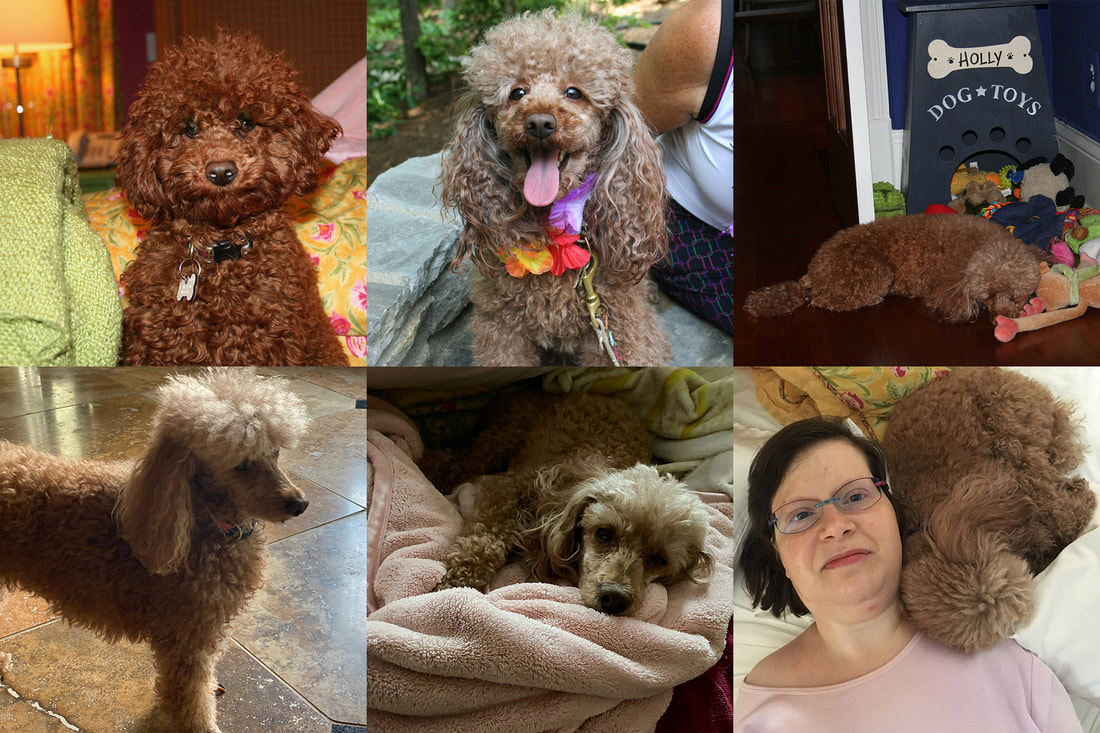
Nearly all of my life has been spent with a poodle in it. I had a poodle as a protector and loving companion even before I was born. Getting a poodle puppy was one of the first things my parents did when they returned from their honeymoon. If I add up time when we didn’t have at least one poodle in my life, it’s only 8 months, which adds to approximately 1%. I consider myself very blessed. So when our family lost our sweet red girl Holly to cancer in late April after what had been a tough year for me physically and emotionally, I felt the void quite deeply. We have loved each of our poodles with our whole hearts. With each one, we’ve learned new things that have allowed us to become better caregivers. With Holly, we learned of the importance of using breeders who try to preserve the best qualities of the breed and take many steps to try to prevent passing along bad health traits. Three of our previous dogs have had unknown heart defects (both affected dogs were siblings) or eye disorders that either shortened their lives or caused unneeded disability. It’s still impossible to predict everything. Even if we would have known that we would lose Holly to cancer, we would have still chosen to have her as part of our family and to love her as much as we could in the 12 years she was with us. (She was 13 when she died but was nearly a year old when we got her.) Yet if we can save any of our dogs from suffering in any way, we will. I still miss Holly dearly. She was special in many ways. Here are just a small number of them. She had a unique way of playing that was so funny to watch. Sometimes we would hear the noise of a wild animal and a toy would simply fling through the air, catching her by surprise as much as it did us. She recognized when someone in our family needed extra support. She spent much of her day in or near my room. I think she thought is was her space as much as it was mine. I’m okay with that because it meant I got to spend a lot of time with her. She considered one of the chairs in my room hers. Others were free to sit in it, but that often meant sharing. She felt strongly that everyone who came to our home was here to visit her. As much as I still miss our sweet girl, I’m learning to love a poodle puppy named Henry who came into the world four months ago and into our family two months ago. Well, that doesn’t sound quite right. From the beginning, Henry was easy to love. But I’m learning so much about the world of puppies that I never realized before. I’m looking at the world through new eyes, his eyes. A few observations: First, puppies change amazingly fast. Henry still loves being around us, but he is no longer the tiny puppy that would be content sitting by my feet or always nestled by my neck or in someone’s arms. He wants so much to explore the world, as he should. At a recent vet appointment, the doctor called him “fearless with an attitude”, and he meant that in the best way. This is our job: to help him be a confident puppy. Puppies/dogs can be the best medicine (though they also require a lot of work and no one should ever get a dog without expecting to put in as much time and love as they get back). Henry has brought laughter back to us. He is an enthusiastic bundle of joy except when, as puppies inevitably do, he collapses for occasional naps, which is part of the normal process of growing so much so fast both physically and mentally. We still have our beloved traditional vet. Yet we are also exploring considerably more holistic options, whether it’s flea and tick control, food, or other things that help keep our pets happy and healthy. In all these years, I never realized that traditional flea and tick medications are pesticides. And, though my family doesn’t rely on highly processed foods for ourselves, the reality is that much of the dog food world is that way. Yet it doesn’t have to be. There are better options. And Henry deserves the best we can give him. P.S. We unfortunately never took a lot of video of Holly and wish we had. If there is one tip I can pass along, it is don’t underestimate the value of photos and especially videos!
1 Comment
10/21/2022 0 Comments Start littleWhen I was a child and voracious reader and starting to learn the power of the imagination, I discovered
E.B. White, most well known for Charlotte’s Web. He also wrote a book called Stuart Little. When I first saw that book, my brain read it as “start little”. Even though I know better now, I still say "Start Little" to myself and smile. I’ve been going through a tough time lately—physically and emotionally my life got turned upside down in late summer—though mostly things are gradually getting better and brighter, at least when I look at the longer trajectory of the last few months. I try to remind myself of that on days that still feel raw and rough, Here are some of the things that have helped. Start little. Take each moment as it comes and try my best. Don’t try to tackle all of the problems at once or they will seem overwhelming. Mind-body practices: Guided meditation and somatic tracking have become my good friends. I’ve been doing these things to some extent in the past two years, but I’m only now learning that sometimes I need to do these things for much longer than I thought to notice my nervous system, strange sensations, and tight muscles calming down. Feeling the feelings. Physical and emotional. Blocking them out doesn’t help. (That said, also don’t try to dwell in the land of the overwhelmed—though easier said than done sometimes. After all, we are human.) Be Your Own Medicine class. This is so much more than a pain management class. A simple class description from its creator because I can’t think of a better way to describe it: “Harness mind-body healing, neuroscience, somatic meditation and the power of community to heal from the ‘incurable’.” I wish I had learned these lessons many years ago when I first started getting headaches as I dealt with my first major disease (FOP) flare-up that lasted for years and made me feel different from everyone else in the worst way. (And if you are new here, FOP stands for fibrodysplasia ossificans progressiva, an extremely rare disease which causes bone to grow in muscles, joints, and other connective tissue, progressively and severely restricting movement.) People. I’m not a hugger by nature and can’t give hugs at all—except for the virtual kind. I’ve needed more hugs lately and other reminders that there are people who care about me and want to help. Gratitude. Particularly in tough times, I hold on tight to the things for which I'm grateful. I find something as simple as naming three things I'm grateful for each day—no matter if they are big or small, helps. Music. In April, I made a possible playlist to go along with my word for the year, which is possible. I have playlists for each of my one little words (12 now for each of the past 12 years) , and this is the music I am most likely to play. Currently the playlists most likely to be on repeat are grace, rhythm, and courage. Sometimes possible sneaks in, and I hope to get back to it being my main playlist. Cat game. Some days all I had energy for was a video game I started playing called Simon’s Cat Storytime. I confess I finished the entire story in a month, but each day wove together lessons on people working together, discovering that what we think we know isn’t always as it seems, and well, cats. It was also full of starting over many times as I got points to play the game, lost them all, and had to figure out how to continue making progress. Extravagant Hope. And when I say this, I’m not just talking about trying to stay hopeful even when life feels anything but. I’m talking about a monthly mailer by Brandi Kincaid that she calls Extravagant Hope, which as she puts it is "the stubborn, making its own light in the darkness kind." Each month’s envelope contains a letter, stickers, postcards, books to read, music playlists, illustrated quotes, pep talks, and other bits of life. I especially love her video walk-throughs where she shares more about the contents each month, partly because I need help to flip through the contents of the package and I can watch the video on my own and partly because Brandi has a wonderfully gentle way with words. Soundtracks. The stories we tell ourselves matters. Last year I discovered a book called Soundtracks: The Surprising Solution to Overthinking by Jon Acuff. He tells us to ask three critical questions about the words we whisper (or shout) into our own hearts: Is the story true? Is it kind? Is it helpful? Recently the author and his teen daughters (who did the writing) released a book for teens called Your New Playlist when people read the first book and strongly felt there should be something similar for a younger audience. I’m with them. I became an overthinker in middle school when the disability I live with became more of a force in my world. It was my way of dealing with life when I felt confronted by things no teen should have to deal with. I wish I had a book like Your New Playlist. I’m well out of my teen years, but it is what I’ve recently been reading. Red glitter shoes. Okay, this one is a bit more metaphorical, though I wish I had a pair of red glitter shoes like Dorothy. Well, truly I would want fuchsia ones, but I’m getting off track. When I was younger, I would watch The Wizard of Oz when it came on TV—before the days when you could have your own copy and watch it anytime you wished. Back then and to some extent even today, I thought it was a very scary movie at times, much as life can be. In the end Dorothy learns that the power was in her all along. I’m trying to learn that. 6/20/2022 2 Comments Friendships matterHaving a rare and progressive disability and being a natural introvert haven’t made it easy to develop friendships. Fortunately, I have been able to develop a few close friendships in my lifetime that have made life much better. Unfortunately, in almost all of those cases, the friendships have been mostly long distance. First there was the friend I made when my first hip joint turned to bone in middle school. She was the lifeline I needed: distracting me from pain, carrying my books at school, and being my lunch buddy (Lunch is undoubtedly the worst time of day when you feel different, and yearbook day is like a million lunches.). A year later my family moved and, though she and I remained close friends, I no longer had anyone by my side on a daily basis that wasn’t part of my family. Later came the friend I made when she was trying to help a patient with the same rare disease that I have. Did I mention that she is a doctor in Brazil, which is no where near Tennessee? Much of our friendship developed online, though now we try to get together in person at least once a year. That hasn’t happened since 2019 because of Covid, but it hasn’t stopped us from dreaming and hoping.
I try to justify the fact that I don’t have a lot of friends by saying that dealing with my disability is a lot of trouble. Well, that is partly true. Nothing about fibrodysplasia ossificans progressiva (FOP), a disease that causes bone to form in muscles, joints, and other connective tissue, progressively and significantly restricting movement, is easy. At the same time, I believe I have a lot to offer as a friend, mostly because I can now see myself through the eyes of the few friends I have. I am very grateful for that. Writing on the subject of friendship when you have a disability came foremost to my mind recently for two reasons. Recently I read a social media post written by a mom who wanted to find summer plans for her son who shares my same disability and was very disappointed and frustrated at the lack of options. Many other mothers responded with similar concerns. One mother, whose daughter is now an adult, wrote about those particularly hard years of adolescence, saying, “I lost faith and trust in so much, but never in my daughter.” It reminded me of lonelier times before I learned to keep myself entertained and stopped worrying that so much of the world and the people in it felt closed off to me. Then I read another post from a mom whose 8-year-old daughter was starting to feel different from her peers. The saddest part is that Isla, this young girl, is my hero. She does things you might never think she could do with her level of disability: riding and caring for horses, dancing and gymnastics, and living her best life. Her dream is to open a happiness store. So, if you are reading this, I have a challenge for you. Look past the obvious challenges of someone with a disability—whether it’s a physical disability, mental disability, autism, or learning challenges—and make a new friend if you have the opportunity. And if you are a parent, teach your children that we all have certain strengths and weaknesses. Sometimes the weaknesses are just more visible and you have to look closer to see past them to see the good. 1/17/2022 3 Comments Year of possibleAs I mentioned in my last post, I participate in a project called One Little Word. Part writing. Part photography. Part artsy fun. All looking through my world through the lens of a word. Most years my words somehow seem to find me, though I realize that I have to be open to the process and letting them in. This sums up POSSIBLE, my new word for 2022. Possible may seem like an unusual choice for someone with so many limitations outside of my control. If you are new here, I have a rare disease that causes bone to form in my muscles, joints, and other connective tissue, progressively and significantly affecting movement. The irony of choosing this word certainly isn't lost on me. Yet, whatever it means for my life this year, I'm determined to explore what's truly possible.
Possible is recognizing that change can be a positive thing. For much of my life, change has seemed negative. So much change was forced upon me because of FOP. Take back my own power to change. Possible can happen slowly. Good things are seldom rushed into existence. Today is full of possible. And, at the end of the say, if it wasn't all I hoped for, I can still be grateful and recognize that tomorrow is a new day full of possibilities of its own. Possible is feeling all the feelings, living wholeheartedly, and having faith in the process. Possible is feeling grounded but still having the ability to dream. I don't know the limits on possible. No one else does either. Possible needs space. I want to create that space by getting rid of thoughts and things I don't need anymore. More to come as 2022 unfolds. 1/17/2022 0 Comments Year of rhythmSince 2011, I've participated in an online class (and community) called One Little Word.
Before looking ahead to 2022, I wanted to look back on the things I want to remember about 2021 and my word rhythm. I want to remember that how I react to what happens around me has a ripple effect. Pause before responding. It all affects the rhythm. I want to remember that the pandemic, my disability, and the ways in which both affect my family's life is something I can't help, and therefore something I shouldn't feel guilty or sorry about. I want to remember that rhythm is a grounding thing. As lost as I've been sometimes this year, I feel grounded in this moment. And that matters. I want to remember that I'm capable of rhythm. It may seem harder to find sometimes—as life seems to get harder with each passing year—but I'm determined to reclaim it in whatever new form it takes and will appreciate it all the more. I want to remember that I can create new neural pathways and learn new patterns of thinking that serve me better than old habits. Not all change is bad. (Because of FOP. I think I'm more likely to be wary of change.) I want to remember this: "You may not be in a rhythm quite yet, but there is rhythm in your heartbeat. And even in the waiting, that means something."—Morgan Harper Nichols I want to hope that better days are ahead because we learn through the hard stuff. 12/15/2021 1 Comment Rhythms and routines-Part 2
I'm trying something a bit different today. Last month I hosted the online workshop that I mentioned in my most recent post. Life has been a bit of a whirlwind since then. I thought I would simply post a link to a video of my daily life that I created for that workshop.
This was my introduction: "Rhythms and Routines That Simplify Our Lives. The tools that help us. Yes. The modifications we make to live better lives. Yes and so much more than this. It's about how we get through our days, even the toughest ones. How we negotiate one more change in our lives. And how we somehow find rhythm in the process. 10/12/2021 0 Comments Rhythms and routines-Part 1Most of the time, what I write in this space is specifically because I write with the intention to post it. In this case, I originally had a different purpose. In November 2021, the support group for families dealing with the extremely rare disease that I have is having an online family gathering. As travel is extraordinarily difficult for me, I’ve been grateful for the opportunity to “meet” online for the past two years as in-person meetings were placed on hold. My last in-person event was in 2000, which feels like a lifetime ago. Earlier this year, I submitted an idea for a workshop called “Rhythms and Routines That Simplify Our Lives” to discuss how to make day-to-day life with FOP a little easier. My idea was accepted and I will be hosting a workshop with the help of several members of the FOP community. As I was gathering my thoughts together, these things came into my head.
First, there is no one-size-fits-all solution to life with FOP (short for fibrodysplasia ossificans progressiva). Families live in different circumstances with different resources. These are 10 things I’ve learned through the years that help me and my family cope and make living with a difficult condition a bit easier. 1. Help. Many of the things I do require help from others. A few things can be done independently, such as using the TV or the computer. Over the years, I’ve figured out that sometimes I’m better off letting others help me more because it allows me more time to do the things that I enjoy. That’s a place where we each have to figure out which approach works best for us. Another useful thought is remembering that, no matter how dependent I am on others, help can still be a two-way street. I try to make a special effort to help others in ways that I can—computer help, learning more about a topic and then teaching it, etc. 2. Schedule flexibility. I find that I work best when I have a schedule, but also schedule some built-in flexibility. 3. Space and “free time”. I find that my family works best when we all get some space to enjoy different things. That’s been harder during Covid-world, but we try. One thing that really helped a lot was when we took the big step of getting a part-time caregiver so my parents could have more free time. It’s been helpful for me as well because it gives me someone outside of my family to whom I can relate. 4. Change is necessary, but not all changes are inevitable. When I was growing up, my family had no idea what to expect from FOP because we didn't know other families who lived with my condition. Looking back, there are things we could have planned for better if we had known what the future might have held. One-story homes are awesome. Ways to avoid stairs are extra awesome. Roll-in showers are really nice. But you can’t predict everything that will happen. Don’t try! 5. Be okay with plans not working out and look for the good in some of the most difficult situations. If you are going through a really tough time, name 1-3 things each day that you are grateful for. I like to think of this as the “silver lining” rule. For example, all of my favorite people are people I wouldn’t have met if I didn’t have FOP. And I’m fairly certain that I’m a stronger and more empathetic person because of FOP. 6. Embrace the place where you are even when it turns out differently than you expected. When I was in my 20s, I pictured myself working full-time in a job I loved. Once my elbows became fused, it became more difficult to pursue my chosen career of teaching. Anyone who knows me will tell you that I always find plenty of things to do now—even though I spend most days at home. I have a better balance of different things in my life too. 7. This one is in honor of dads. Duct tape can solve everything. Well, not everything, but I use it every day when I brush my teeth and it was used for my original extension fork when I woke up and couldn’t bend my arm. It’s an example of how special tools don’t have to be fancy or expensive. 8. It will likely take longer than you think. I’m notorious around here for underestimating how much time it will take to do something. Maybe that happens to you too—in lots of little and big ways, from how long it takes to do a seemingly simple thing to how long it takes a flare-up to resolve. 9. Sometimes you have to invent new guideposts and change things up when old ways aren’t working. 10. Show love, kindness, gratitude, and grace whenever possible. It’s hard being dependent on others, and it’s hard on others for us to be so dependent on them. P.S. There is no such thing as perfect or normal. And the world would be boring if there was! 8/19/2021 1 Comment World photography dayThere's a day devoted to nearly everything. That said, there truly should be a day devoted to photos. They are as close as we can come to preserving moments small and momentous—and in my opinion equally important in different ways. Well, today is that day. In honor of World Photography Day. I'm offering a few tips related to photos.
Backup. Backup. Backup. Do you have backups of all of your favorite photos–even the ones in old photo albums that may not have been digitized? If not, start now! Make sure you have at least two copies, preferably one that lives off-site in case of an emergency. The Backup Bootcamp course teaches you how to do this and organize your photos. (It relies on the cloud.) If you prefer localized options, external hard drives are a great solution. If you are feeling overwhelmed and want someone to start the process for you, here is another option for organizing your photos. Taking better photos. I've always been a big believer in learning. That applies to photography too. I'm currently taking The Magic of Moments through Ali Edwards. For a deeper dive into the combined world of photos and storytelling, also consider Lens of Joy. Use your photos. Put a photo in a frame. Make a photo book. Start simple. I also love Stacy Julian's Photo Freedom class. I think I first took it in 2007. The more comprehensive paid class is currently on-going and isn't enrolling new students right now. However, this mini self-guided class is available for free and teaches the guiding principles designed to get you using your photos and thinking about them in new ways. It is likely very different from any class you've ever taken on the subject. Stacy loves finding creative ways to use photos. Here are some ideas. Here is one more. And if you need more reasons to do something with your photos, read this: The Most Published Generation Will Have No Photos in Ten Years by Photographer Mike Yost. Thought it was published in 2015, the article is still very relevant today. 7/10/2021 0 Comments Magic wandsItem 48 on my list of 50 is this...Distribute magic wands. (What?!?!?!) I thought it was a good time to bring back magic wands. Lots of people I know could use one right now. So here is what I said during the original kindness matters challenge that led to the creation of this website.
I've seen other kindness lists, but I don't think I've seen magic wands on any of them. So why are they on my list? I’ve often found myself wishing I had a magic wand that could make things all better when times are tough. I’ve realized that the tough times help shape us into who we are, though I still believe in the power of positivity, prayers, good vibes, and yes, a bit of pixie dust. I'm inviting people to help put more magic wands into the world with the following words: "Please accept this wand in the spirit that it has been given. There is no magic in the wand. Energy and magic comes from you and into the wand! Say the following 5 times when you wish to use the wand: “With this wand, I use my magic for good and peace.” How does one create a magic wand? Apparently with the help of Pinterest! Here is a link to different wands, ranging from wands with flowy ribbon, wands wrapped in delicate beads, and magic wands that do double duty as bubble wands. How to create a magic wand. Download an explanation of how to use the wand that you can pass the information along to recipients of this special kind of magic. 6/22/2021 5 Comments Lost opportunitiesThose who know me know that I don’t dwell on the things I can’t do. However, when the world makes it nearly impossible to do some of the things I CAN do, that is when I get frustrated. Here are some of those things…
I’ll start with the one that made me think about this topic again. 12 South Farmers Market Peach Fest. First, you have to understand that I love peaches, perhaps more than any other person on the planet. I was born in a state second only to California in peach production—and it may not be the state you think. I love fresh peach pie on my birthday (or any time!), peaches and oatmeal for breakfast, and peaches served almost any way. You would think having a Peach Fest in a park not far from my home today would be cause for celebration. You would be wrong. You see, I went to the first Peach Fest in 2015 with my mother and two friends. We had a good time. My mom and I returned the following year minutes after opening—only to find the handicap spaces full with people parked illegally and no other options for parking our oversized van. So back home we went. Getting out is no easy effort. It takes planning and can test my endurance. So to go back home disappointed and empty-handed was…well, there are no words. At least I had none left to say. It was a quiet trip home. Since then I have tried sending emails to the organizers, posted on their social media, sent them private messages. I have NEVER received even one response. The most kindness I received was from a vendor who makes wonderful pies, who expressed her sympathy and said that she hopes to open her own pie shop and make it accessible to people with disabilities. Our world truly needs more people like this. Today is Peach Fest AGAIN, and I’m not going. Fortunately there is an accessible fruit and vegetable market down the street that has wonderful peaches. We may get some of them and have our own celebration. (Thanks to a sweet friend for letting me know they carry peaches from my favorite state.) Now for the issue that truly tugged at my heart for a long time. I can handle stares from people because I look different. I don’t mind answering questions about my disability because that’s how people learn. The one thing you don’t get warned about is the silent and unprovable discrimination you encounter. I was fortunate to have parents who valued education. I was fortunate to have a university in my city that made numerous accommodations so that I could go to classes, a mom who drove me back and forth each day and spent more time in the library than I did searching for books I needed for papers I needed to write. After six years, I had a graduate degree and was ready to take on the world. Well, STOP. You see, I was unprepared for a world that didn’t look past my disability. I thought teaching would be a field where people would be more open in addition to being something well-suited to my skills. I had interviews. I worked as a substitute and didn’t get calls back to any of the schools except the one I attended, as some of the teachers knew me and what I was capable of. It was so discouraging because I always knew one thing: I wanted to work very badly, and that should have been enough. I became a part-time substitute teacher for the school down the road and a part-time tutor, as self-employment was my best and only apparent option. I enjoyed the years I spent teaching. In hindsight, all the more because my disability progressed and I can no longer do those things. (Honestly, the thought that one day I might not be able to work never occurred to me.) Looking back, I don’t think any of the people I encountered purposefully treated me different because of my disability. So part of my purpose in writing this is to ask you, my readers, to be open to the fact that people with disabilities do have something valuable to contribute to the word. We want to be part of it. If you encounter a person with a disability, know they don’t want to be treated as an inspiration or something extra special. They just want to be given the same opportunities as everyone else. We just sometimes need a little extra help from you to get there, whether it’s an open mind or a willingness to see the things that unintentionally make our world a little smaller. |
About meHello. My name is Sharon Kantanie. I'm 54 years old. I have an extremely rare disease called fibrodysplasia ossificans progressiva. I believe in courage, kindness, and other things. Welcome to my little home on the world wide web where I hope to share information on the Kindness Matters Challenge, my life, and the things that matter most to me. Archives
September 2023
Categories |
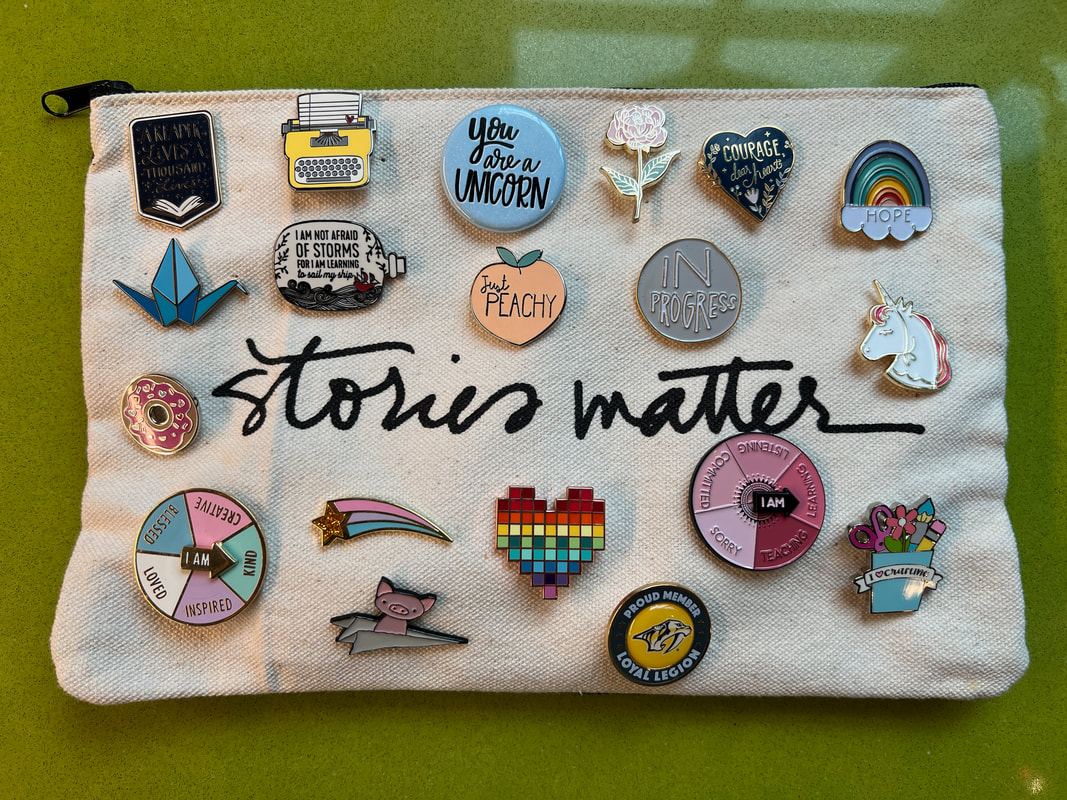
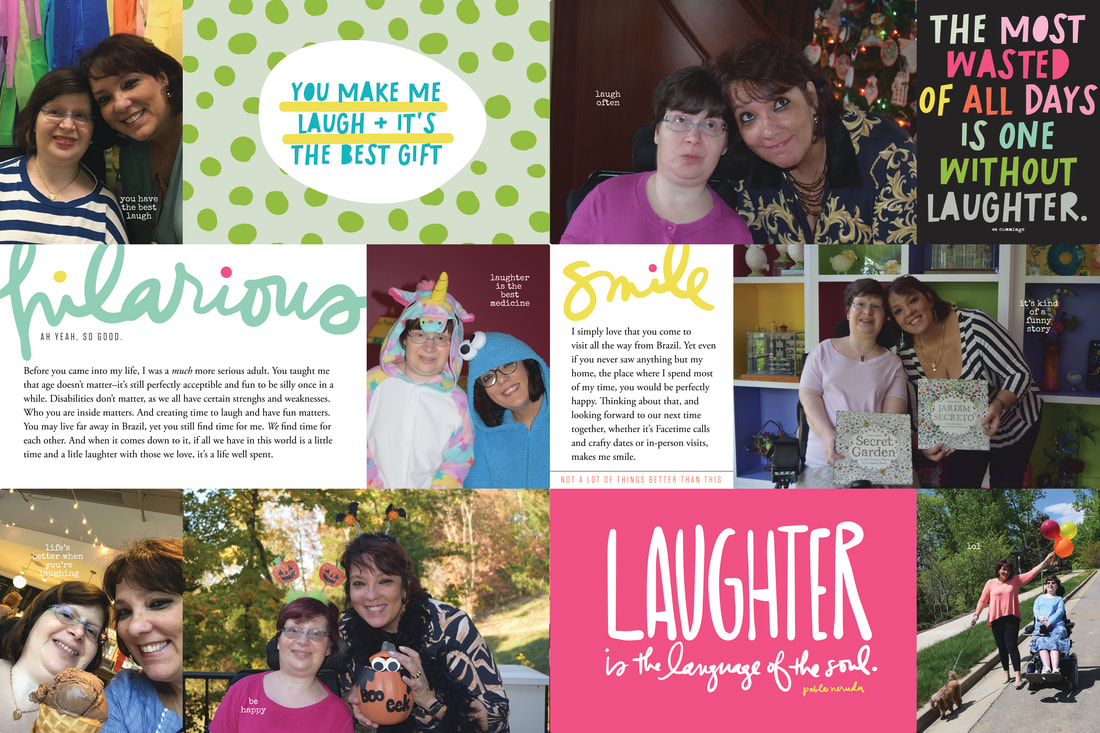
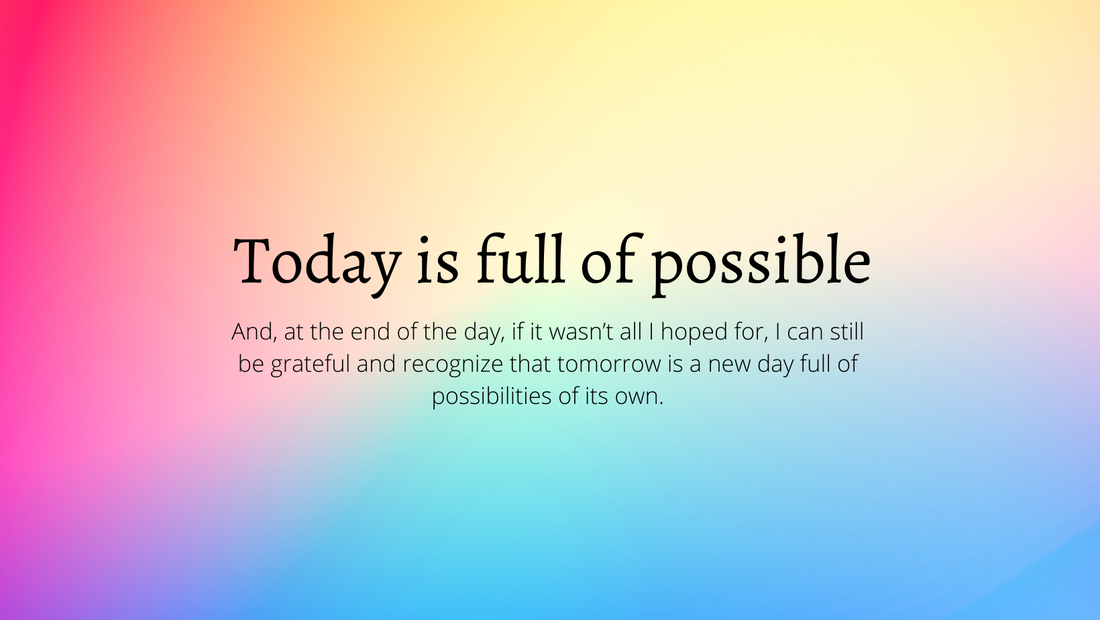
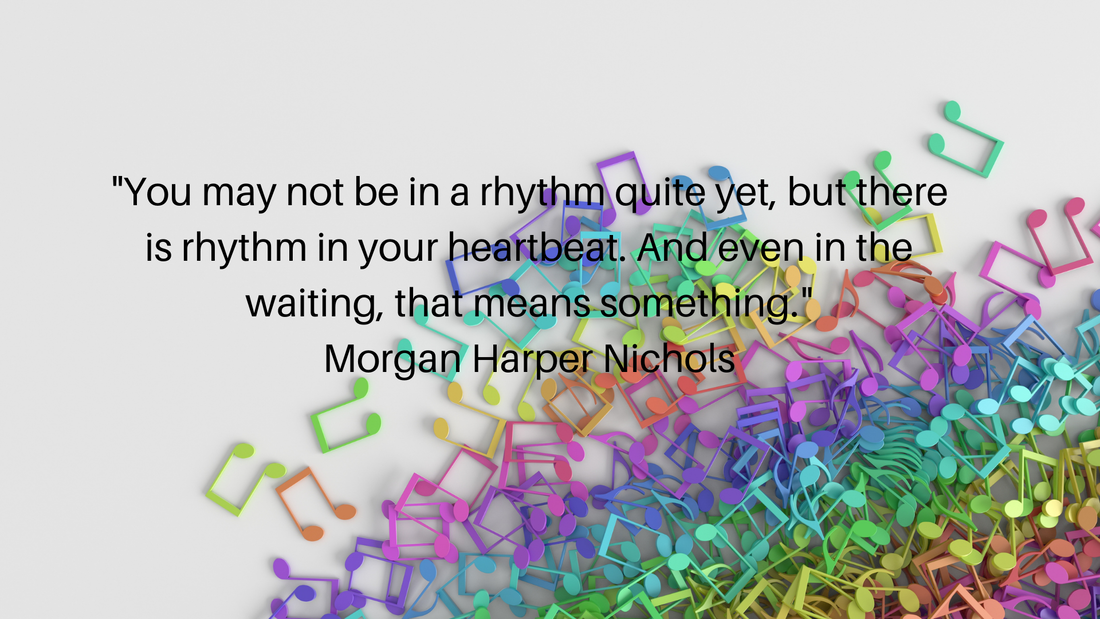
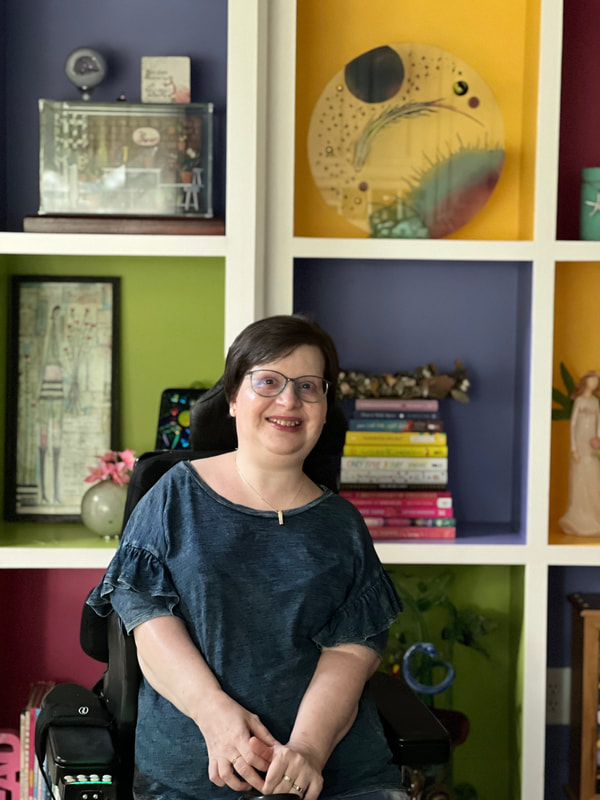
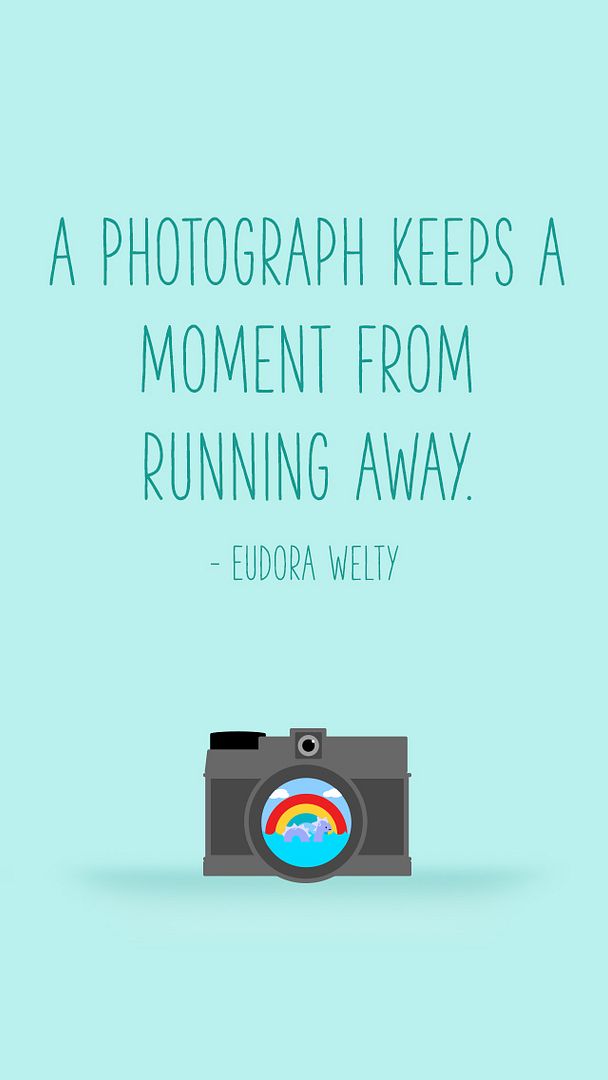
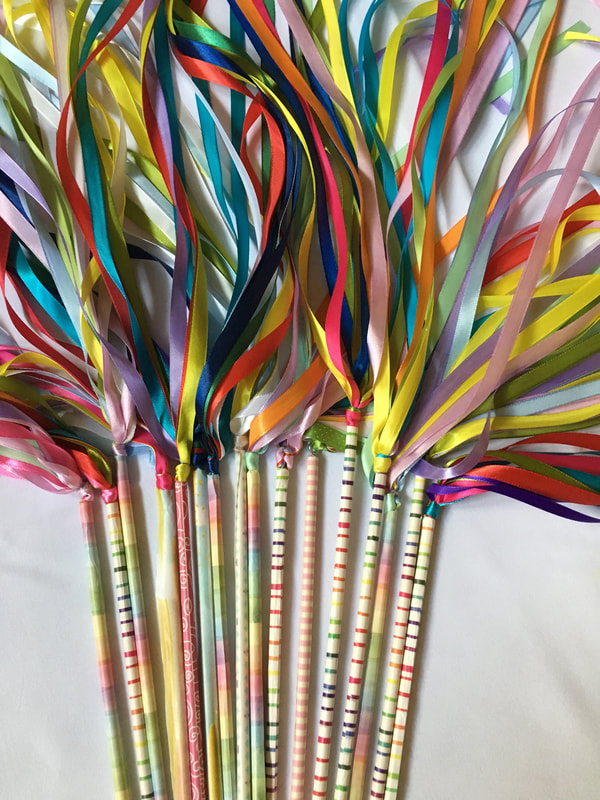
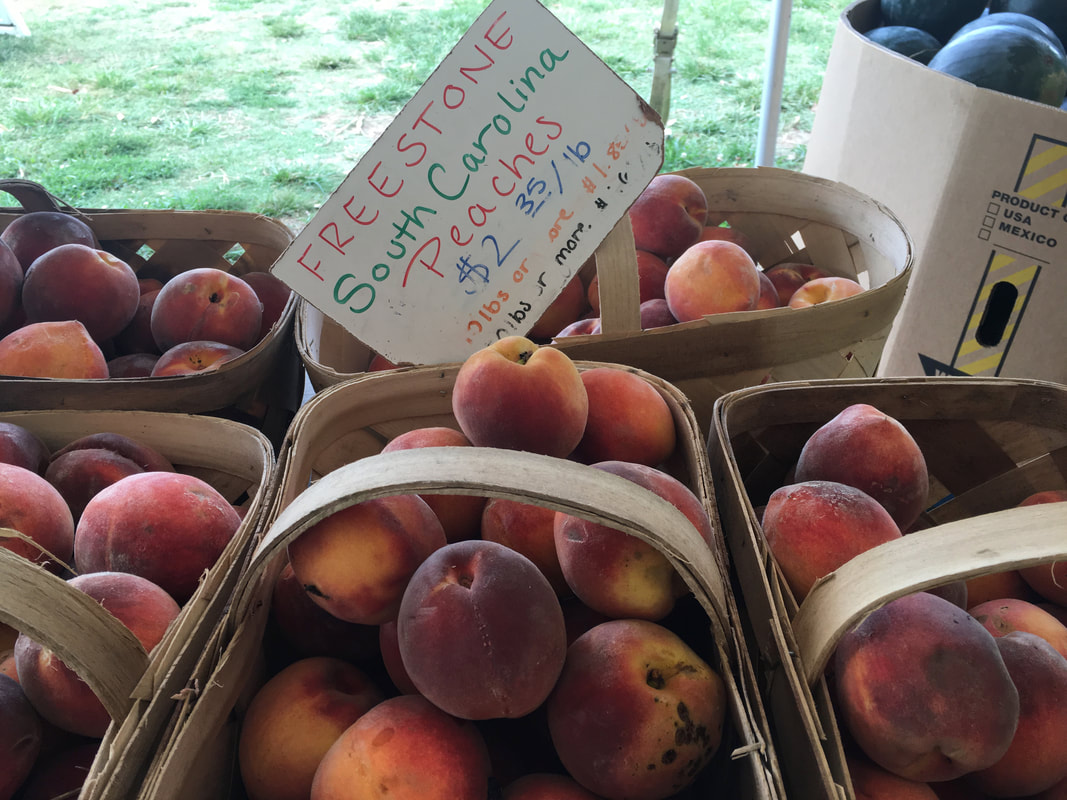
 RSS Feed
RSS Feed